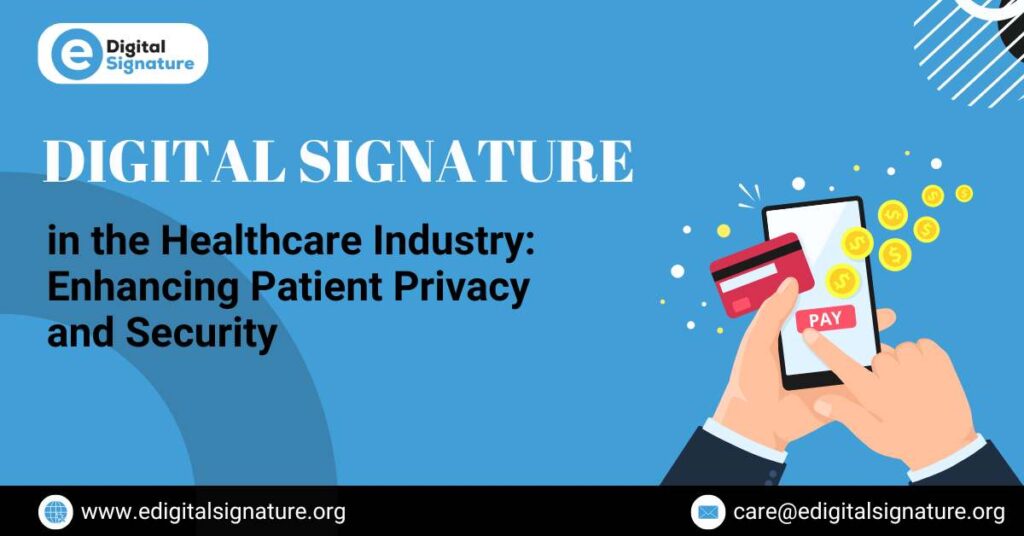A digital signature certificate (DSC) is an electronic document that serves as a digital equivalent of a handwritten signature. It is issued by a trusted third party, known as a Certificate Authority (CA), after verifying the identity of the certificate holder.
A Digital Signature Certificate typically contains information such as the holder’s name, their public key, the issuer’s name, the certificate’s expiration date, and the issuer’s digital signature to ensure its authenticity.
Importance of Digital Signatures in Healthcare:
Authentication and Identity Verification:
Digital signatures provide a robust method for authenticating the identity of healthcare professionals, patients, and other stakeholders involved in medical transactions. By using cryptographic techniques, digital signatures verify that the sender of a document is who they claim to be, reducing the risk of fraud and unauthorized access to sensitive information.
Integrity of Electronic Health Records (EHRs):
In the era of electronic health records, maintaining the integrity of patient data is paramount. Digital signatures ensure that EHRs remain tamper-proof by detecting any unauthorized modifications or alterations to medical records. This helps in preserving the accuracy and reliability of patient information, thereby enhancing the quality of care delivery.
Compliance with Regulatory Standards:
Healthcare organizations are subject to stringent regulatory requirements aimed at protecting patient privacy and maintaining data security. Digital signatures play a crucial role in ensuring compliance with regulations such as HIPAA, which mandate the use of secure electronic transactions and the safeguarding of protected health information (PHI). Implementing digital signature solutions helps healthcare providers meet these regulatory obligations while fostering trust and transparency in healthcare operations.
Streamlining Workflows and Enhancing Efficiency:
By digitizing signature processes, healthcare institutions can streamline administrative workflows, reduce paperwork, and minimize manual errors. Digital signatures enable the electronic signing of consent forms, treatment plans, prescriptions, and other medical documents, leading to faster turnaround times, improved productivity, and better resource allocation within healthcare facilities.
Implementation Challenges and Considerations:
Despite their numerous advantages, the implementation of digital signatures in the healthcare sector may pose certain challenges and require careful consideration. Some key factors to take into account include:
Security Concerns:
While digital signatures offer enhanced security compared to traditional paper-based methods, they are not immune to cybersecurity threats. Healthcare organizations must invest in robust encryption protocols, secure key management systems, and regular security audits to mitigate the risk of data breaches and unauthorized access to sensitive patient information.
Interoperability Issues:
Achieving seamless interoperability between different electronic health record systems and digital signature solutions can be complex. Healthcare providers need to ensure that their chosen digital signature technology is compatible with existing software platforms and interoperable across different healthcare settings to facilitate the exchange of digitally signed documents among stakeholders.
User Training and Adoption:
Transitioning to digital signature workflows requires comprehensive training programs to familiarize healthcare professionals with the new technology and ensure proper usage. Resistance to change, reluctance to adopt new processes, and concerns about usability may hinder the widespread adoption of digital signatures within healthcare organizations. Therefore, effective change management strategies and ongoing support are essential to encourage user acceptance and facilitate a smooth transition.
Legal and Regulatory Framework:
While digital signatures offer legal validity and compliance with regulatory standards, healthcare providers must stay abreast of evolving legislation and regulatory requirements governing the use of electronic signatures in healthcare. Navigating complex legal frameworks, understanding jurisdictional differences, and ensuring adherence to industry-specific regulations pose ongoing challenges for healthcare organizations seeking to implement digital signature solutions.
Future Directions and Innovations:
Looking ahead, the future of digital signatures in the healthcare industry holds immense promise for innovation and advancement. Emerging technologies such as blockchain and decentralized identity solutions are poised to revolutionize the way digital signatures are utilized in healthcare, offering enhanced security, transparency, and data integrity.
Blockchain Technology:
Blockchain, with its decentralized and immutable ledger system, has the potential to revolutionize digital signatures in healthcare by providing an auditable and tamper-proof record of transactions. Blockchain-based digital signature solutions can enhance the security and integrity of medical records, enable secure sharing of patient data across healthcare networks, and facilitate trusted collaborations among stakeholders while ensuring compliance with regulatory requirements.
Decentralized Identity Solutions:
Decentralized identity solutions based on verifiable credentials and self-sovereign identity principles offer a promising alternative to traditional identity management systems. By empowering individuals to control and manage their digital identities securely, decentralized identity solutions enable seamless authentication and authorization processes, reducing reliance on centralized identity providers and enhancing privacy and data sovereignty for patients.
Artificial Intelligence and Biometrics:
The integration of artificial intelligence (AI) and biometric authentication technologies can further enhance the security and usability of digital signatures in healthcare. AI-powered authentication algorithms can analyze behavioral patterns and biometric data to verify the identity of users, offering an additional layer of security against identity theft and fraud while improving user experience and accessibility.
Read also Digital Signature Certificate for Income Tax
Conclusion:
In conclusion, digital signatures represent a fundamental component of modern healthcare systems, offering a multitude of benefits in terms of patient privacy, data security, and operational efficiency. By leveraging cryptographic techniques to authenticate identities, validate document integrity, and ensure regulatory compliance, digital signatures empower healthcare organizations to safeguard sensitive information and enhance trust among patients and stakeholders. As the healthcare industry continues to embrace digital transformation, the adoption of robust digital signature solutions will play a pivotal role in driving innovation, improving healthcare delivery, and ultimately, enhancing patient outcomes.
